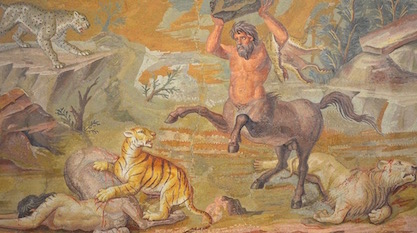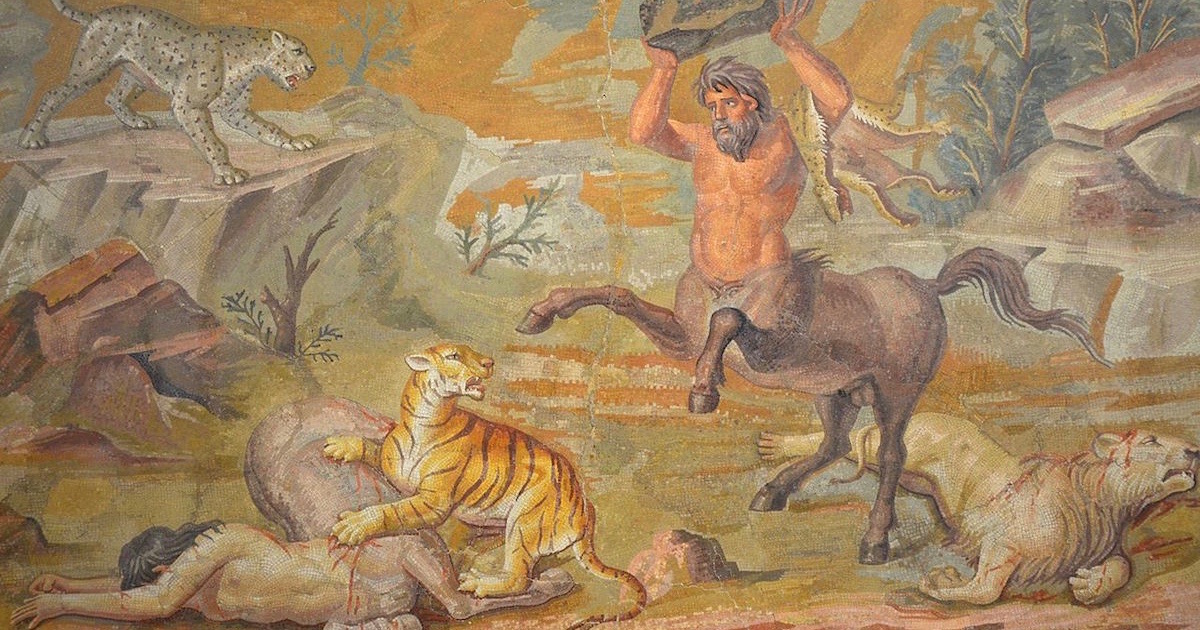 Faith & Science
Faith & Science
Helpful Atheist Makes a Case for God


Atheist biologist P.Z. Myers offers a video titled “Key Concepts of Evolution.” He talks about six of them. Number five is of interest to us here. Myers:
Evolution is a contingent process. Everything is the way it is because of how it got that way. The way we are is the product of millions of years of local short-term choices that influence everything that follows after. I’ve seen people seriously argue that bipedalism is an optimal choice and that any aliens from outer space we encounter have to be similarly bipedal. No. We are bipedal because our ancestral proto-amphibian wriggled up on to the land had two pairs of fins and we are and are descended from tetrapods that only had four limbs. This existing bipedalism is an awkward kluge to bring some manipulatory specialization out of a limited battery of limbs. If only tiktaalik had inherited three pairs of stubby little old fins we’d be centaurs now.
Perhaps. Myers focuses on only one meaning of contingent: chance. Evolution is clearly subject to chance to some extent. Chance events (mutations, accidental deaths) happen, and these chance events can influence the evolution of populations.
But there is another meaning to contingent that is highly relevant to evolution: evolution of a trait is dependent on circumstances that accompany and precede it. A trait appears in a population because a certain constellation of events — genetic mutations and recombination, environmental constraints, inherent biochemical and structural restraints — happen. Traits don’t emerge sui generis. Evolution has antecedents and constraints and sometimes chance.
But we can ask an interesting question about this second meaning of contingency — dependence on constellations of causes — which is so much a part of evolution. How far back can contingency go? After all, if every evolved trait is contingent on a prior evolved trait and on environmental circumstances as well as chance, can this line of dominoes of contingency go back indefinitely? How does contingency get its start?
Myers would likely reply that “the primordial universe is the start. The universe is the fundamental existing thing.” That’s the stock atheist answer. But it’s wrong — the universe can’t explain contingency completely. Here’s why.
There are two kinds of causal chains in nature. Accidental causal chains are sequential causes and effects that don’t depend on the continued existence of a cause to produce an effect. An example would be human generation. You were caused by your father (in a sense), who was caused by his father, who was caused by his father, etc. But in order for you to be caused, your grandparents don’t have to be still living. Effects don’t depend on the simultaneous existence of the whole chain of causes. This accidental causal chain can (in theory) go back to infinity. There is no logical necessity for a first cause.
Essential causal chains are different. Essential causal chains are causes and effects that depend on the continued existence of the entire causal chain to produce an effect. An example would be a stack of books. The configuration of the stack (with the last book on top as the “effect”) depends on the simultaneous existence of each book below it. Take out any book, and the effect is precluded — the stack is no longer the same stack, or it falls.
Nature is full of both accidental and essential causal chains. An animal’s heartbeat depends on contraction of myocardial fibers, which depend on ATP, which depends on chemical energy in molecular bonds, which depends on energy from food, which depends on photosynthesis, which depends on sunlight, etc. This is an essential causal series. If any of these causes is absent (e.g. the ATP runs out, the animal starves, there’s no sunlight, etc.), the effect (the heartbeat) stops. This essential series of causes cannot go backward to infinity. Of course there are accidental causal chains in nature as well: the animal has ancestors that “caused” it, and the ancestors don’t have to all be alive simultaneously. Nature has both accidental and essential causal chains.
Although an accidental causal chain can go back to infinity, an essential causal chain can’t. Why can’t an essential causal chain go back to infinity? Consider the structure of an essential causal chain. There are conceptually three kinds of components of the chain: the final effect, the middle causes, and the (putative) First Cause. The middle causes in the essential causal chain derive their power to cause an effect from the causes prior to them; they don’t have independent causal power. They can’t cause themselves. In a stack of books, a book in the middle of the stack doesn’t have the power to hold the stack up by itself. It depends on the book beneath it. The heart of an animal doesn’t have the power to beat all by itself. It depends on the energy supplied by ATP, which depends on chemical bond energy, food, photosynthesis, etc.
Middle causes in an essential causal chain are contingent. They lack inherent independent causal power. They depend on prior causes to work.
So why can’t an essential causal chain go back to infinity? The reason is that if it is an infinite chain, all of the causes are middle causes, and all of the middle causes lack inherent causal power. If the chain is infinite in priority, there is no inherent causal power in it, and the chain of causation can never get started.
An essential causal chain requires a First Cause. The atheist’s retort here would be “so the First Cause is the primordial universe itself.” But that’s not true. In order to be the ground for an essential chain, the First Cause needs to have several characteristics. It needs to exist of Itself, necessarily, without any contingency of its own, because if it is contingent on another cause, then it’s not the First Cause. But the universe doesn’t exist necessarily — there’s nothing about the universe that necessitates its existence. The universe does not exist because of itself — it cannot be the cause of itself, which is a nonsensical concept. The universe is clearly contingent on the laws of physics, etc.
Furthermore, the First Cause must be purely actual, without any potentiality. That is, it must be unchanging and unchangeable, because if it is changed, then there is a cause prior to it that does the changing, and it is not really the First Cause. The universe is loaded with potentiality; it changes continuously (you might even say, with the scholastic philosophers, that the material universe is defined as “that which undergoes change”). The universe cannot be the First Cause. It is a middle cause, and has no wholly independent causal power of its own.
So evolution, as a contingent process in nature that contains some essentially ordered series of causes, requires a First Cause that is outside of nature. Of course, that First Cause is what men have called God.
If P.Z. Myers follows his own argument about contingency a bit further, he would see that atheism is inconsistent with the contingency on which evolution necessarily depends.
